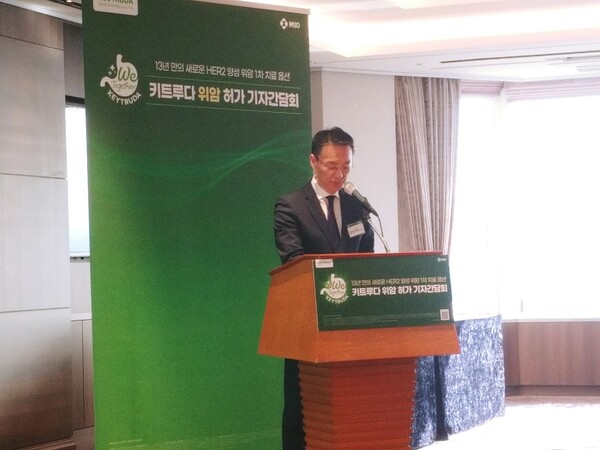MSD Korea highlighted the importance of biomarker pathology testing for the treatment of gastric cancer patients to improve the utilization of the anti-programmed cell death protein-1 (PD-1) immunotherapy, Keytruda (pembrolizumab), on Tuesday.

Lee Hye-seung, Professor of Pathology at Seoul National University Hospital, explained the need for reimbursement of the IHC 22C3 pharmDx (22C3) test, a PD-L1 test, for the use of immunotherapy in the treatment of patients with metastatic gastric cancer.
"Biomarker pathology diagnosis is important for gastric cancer as biomarkers can predict drug response and effectiveness in advance," Lee said. "I hope that the diagnostic test for Keytruda therapy in patients with (human epidermal growth factor receptor type2) HER2-positive advanced gastric cancer will be reimbursed as soon as possible."
Keytruda (pembrolizumab) has been approved by the Ministry of Food and Drug Safety (MFDS) for the first-line treatment of HER2-positive advanced gastric cancer or gastroesophageal junction (GEJ) adenocarcinoma in December last year.
Rha Sun-young, Professor of Internal Medicine at Severance Hospital, said that Korea has the third highest incidence of gastric cancer in the world, with a five-year survival rate of only 6.7 percent when metastasized.
“HER2-positive gastric cancer, which occurs in 10-30 percent of gastric cancer patients, has long been an area of significant unmet need due to the lack of new first-line treatment options,” Rha added
The KEYNOTE-811 trial, on which this approval is based, compared Keytruda with trastuzumab in 698 patients with metastatic HER2-positive gastric cancer and GEJ adenocarcinoma.
Median overall survival (mOS) was 20.5 months with Keytruda, compared to 15.6 months with trastuzumab.
"Results from the KEYNOTE-811 study confirmed that Keytruda provided a superior clinical benefit over the control arm," said Rha. "The strong first-line benefit of Keytruda, beyond the limitations of existing therapies, is expected to improve survival in the first-line treatment of HER2-positive advanced gastric cancer patients in Korea."
Median progression-free survival in the Keytruda arm remained at 10.9 months, representing a 29 percent reduction in the risk of disease progression and death compared to 7.3 months in the trastuzumab arm.
"Keytruda, which has been transforming the standard of care in a variety of cancers, can now provide patients with a powerful first-line benefit in gastric cancer," said Albert Kim, Managing Director of MSD Korea. "MSD Korea will continue to work closely with clinicians, researchers, and health authorities to ensure that more patients can benefit from Keytruda in gastric, digestive, and other cancers."
Related articles
- MSD's Keytruda wins 2 new approvals for 1st-line gastric cancer, early-stage lung cancer
- MSD's new breast cancer drug Tukysa lands in Korea
- MSD Korea seeks quick delivery of 15-valent pneumococcal vaccine
- MSD's Vaxneuvance wins permit after 13-year gap in Korea's new pneumococcal vaccine
- Concern became a reality as Keytruda’s coverage expansion stalls

